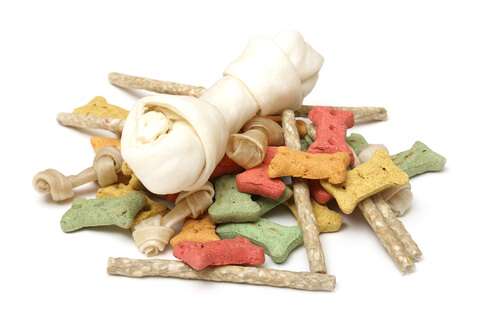- Home
- Cocker Spaniel Health Issues
English Cocker Spaniel Health Issues: How To Keep Your Dog Healthy!
Several Cocker Spaniel health issues may arise during your pet's lifetime.
You can help keep your dog healthy by understanding the type of problems he may come up against and by being prepared for them.
Health issues include ear infections, skin allergies, fleas and ticks, auto-immune disease (AIHA), Kidney disease and Pancreatitis, and more.
Help keep Cocker Spaniel health problems to a minimum!
Cocker Spaniel Health Issues Which May Affect Your Dog
Cocker Spaniels, like all dog breeds, are susceptible to one or two general dog illnesses, for example, eye problems, ear infections, kennel cough, skin allergies, dog bloat, and the occasional injury.
If you take good care of your dog's health, he will live a long and happy life, up to 15 years and sometimes longer!
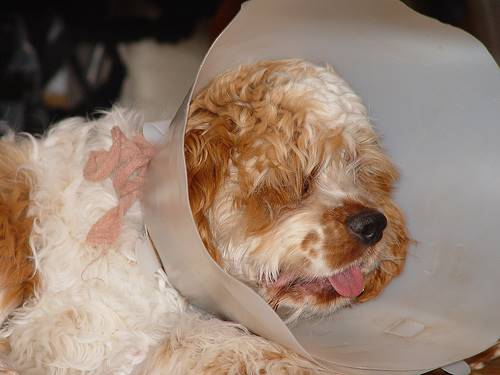 If you take care of your dog's health, he will live a long and happy life!
If you take care of your dog's health, he will live a long and happy life!Happily, you can avoid many Cocker Spaniel health issues by providing your dog with a good quality diet, lots of exercise, weekly grooming, and of course, regular check-ups with their vet.
By watching our pets for early signs of illness, we can nip emerging problems in the bud and help keep our dogs healthy and in tip-top condition!
Cocker Spaniel Health Issues: Hereditary and Common Illnesses
Cocker Spaniel Health Issues
Our Cocker's health means a lot to us (and to them, too!), and as caring owners, we ought to be aware of potential dog illnesses that may or may not rear their ugly heads.
Please be assured that your dog may not be troubled by all the health issues listed below. I've listed them because they are typical Cocker Spaniel illnesses associated with the breed and could affect your dog's health.
- Auto-Immune Diseases (AIHA)
- Patella Luxation
- Epilepsy
- Pancreatitis
- Familial Nephropathy (fatal kidney disease)
- Canine Hip Dysplasia (abnormal development of the hip joint)
- Hypothyroidism (can cause skin problems, obesity, and epilepsy)
- Skin problems such as seborrhoea
- Allergies caused by food, irritants, or inhalants
- Ear infections
- Eye Problems: Progressive Retinal Atrophy (PRA), Glaucoma, Cataracts etc.
- Submissive or excited urination.
Thankfully, many responsible breeders test their dogs for more severe conditions before they breed, which helps to produce strong, healthy puppies and minimises the risk of breeding puppies with unnecessary health problems.
Dog Parasites: Fleas and Ticks
Most dogs, at some point, will pick up unwanted hitchhikers; canine parasites, such as dog fleas, ticks, and ear mites.
You may find it very challenging if you're squeamish and your dog has fleas or ticks. Unfortunately, you will have to learn to deal with them as they're a fact of doggie life!
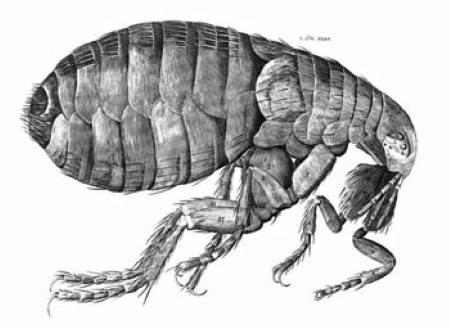 Copyright: Wikipedia
Copyright: WikipediaThe good news is if you protect your Spaniel against ticks and fleas, you may never have to deal with these pests.
You can protect your Cocker with a tick or flea treatment your vet prescribes or buy flea control at good pet stores. There are also natural flea treatments if you prefer a less medicated alternative.
Learn more about these wee beasties and, should your dog be unlucky enough to become infested, learn how to get rid of them from your pet and your home for good! Just follow this link!
English Cocker Spaniel Health Problems: Cocker Ears!
Your Cocker Spaniel's ears may be beautiful; however, their pendulous design is flawed because they don't allow enough air to circulate around the entrance to the ear canal.
 Copyright: JulesInKY at Flickr.com
Copyright: JulesInKY at Flickr.comWithout good air circulation, bacteria can breed quickly, which is why Spaniels often have recurring ear infections.
Ear infections aren't much fun for your dog because they can mean a lot of pain and discomfort for him! If you don't treat an ear infection quickly, it could become a severe problem for your Cocker. In the worst cases, it may lead to your dog losing his hearing.
That's why cleaning your Cocker's ears at least weekly is essential to help fight infection and excess bacteria. It doesn't take long; a few minutes is all you need.
Knowing what to look for will help you to stay ahead of the game and keep your dog healthy. Learn how to check your Cocker Spaniel's ears to keep them clean and free from bacteria and infection.
Ear mites are highly infectious and often found in puppies; however, they're not fussy; any dog's ear will do! Mites can mean a lot of pain for your Cocker, and because they're so small, they are difficult to spot.
You may be forgiven for not knowing your puppy has a problem. Learn more about ear mites and signs to watch out for.
Cocker Spaniel Health Problems: Your Pet's Anal Glands
Sometimes dogs have problems with their anal glands (also known as anal sacs). You'll probably know about it because of the smell, and boy, do they smell!
Your Cocker's anal glands can be found to the left and the right of his anus. They are small pea-like scent glands which, if not functioning correctly, can cause unpleasant problems for your Cocker.
 Copyright: Andrea Izzotti at Fotolia.com
Copyright: Andrea Izzotti at Fotolia.comProblems with anal glands are relatively common in dogs, particularly where their diet is poor or the dog is overfed.
(A poor diet usually produces soft poo, which isn't solid enough to exert sufficient pressure on the glands to empty them).
Where they're not working correctly, your dog's anal glands may become impacted and/or infected and need to be cleared.
If you're unsure about doing this yourself (or you're a little squeamish!), your vet or groomer can teach you how to clear and express your boy's anal glands. When you feel confident, you can clear your dog's anal glands yourself!
My Dog Has Bad Breath!
One of the most common signs of a health problem for your pet is Halitosis, or dog breath as it's commonly known!
If your dog has bad breath, the cause may be indulging in a disgusting habit called Coprophagia. However, your Cocker's dog breath is more likely to be a symptom of periodontal disease or poor dental hygiene, which has given rise to gingivitis.
Bad breath could also be a warning sign that you have a constipated Cocker Spaniel!
Dental chews and regularly brushing your dog's teeth can help keep bacteria at bay and improve his oral hygiene. By the way, if you plan to brush your Cocker's teeth, I recommend brushing your puppy's teeth from an early age so that he becomes perfectly comfortable with the feel of a toothbrush in his mouth.
If your dog's dental hygiene is good, but his breath is terrible, it could signify something more serious. Booking an appointment with his vet would be a good idea to rule out any underlying illness.
Dog Health Care: Poisoning
This subject may not necessarily come under the title of strict Cocker Spaniel health issues, but it is closely related, which is why I decided to place it here.
If we took care to lock away all substances that could be toxic to our dogs, accidental dog poisoning could quickly become a thing of the past. It's as simple as that!
Unfortunately, many Cockers are still accidentally poisoned in and around our homes daily and in many different ways.
 Copyright: Vkarlov at Fotolia.com
Copyright: Vkarlov at Fotolia.comIn the home, many household cleaners are very harmful to our dogs, for example, bleach, kitchen and bathroom sprays, oven cleaners, etc.
The garage also holds many substances which could be hazardous to our pets. Poisons such as rat poison, paint thinners, turpentine, oil and petrol (in cans) sit lurking, just waiting for a bored Cocker Spaniel looking for trouble!
Antifreeze is incredibly hazardous, and because it smells and tastes good to dogs, spills are often lapped up enthusiastically with severe consequences.
Even your garden, the local woods or the parkland where you walk your dog can hold many hidden dangers that could make your Cocker Spaniel very sick if he ate them.
We all know how difficult it can be to closely monitor what our pets pick up in their mouths when they're off the lead. Dogs have accidentally eaten poisonous mushrooms, many with severe consequences.
Many plants are poisonous to our dogs. If your Cocker is an occasional plant eater (aren't they all?), well, that's just another accident waiting to happen!
Even some foods we eat can harm our pets - such as grapes, raisins, macadamia nuts, and even chocolate! And while we're on the subject of chocolate, this is a particularly toxic food for dogs, especially if it's good quality chocolate with high levels of cocoa.
The only chocolate safe for dogs is the specially produced chocolate drops, which you can pick up in most supermarkets and pet stores.
Please don't wait until it's too late. Lock away, or put well out of reach, anything that may accidentally harm your pet.
Keep your dog healthy!
Is It Right To Neuter A Healthy Dog?
Most vets recommend having our Cocker Spaniels neutered because they believe castrating a dog (or spaying a bitch) can prolong their lives and help reduce canine health problems.
Here, I explore the benefits and pitfalls of neutering a dog and some myths surrounding castration and spaying.
Just for the record, my Cocker, Max, is neutered.
Is An Overweight Dog Healthy?
Is an overweight dog healthy? Probably not!
Overweight dogs often have more health problems, such as diabetes and issues related to their joints.
And because Cockers tend to put on weight after being neutered, keeping an eye on your dog's weight after he's been fixed is essential.
Cockers also tend to become overweight as they move into their older years. To help counteract this increase in weight, I recommend changing your pet onto a 'lighter' kibble (with less protein), cutting down on your dog's treats and keeping up the exercise.
If you're worried about dog diabetes because your pet is overweight, look at these classic symptoms of diabetes to help you decide whether or not there's a problem. Don't try to diagnose diseases or health problems yourself; speak to your vet.
Pet Health Insurance
I wanted to mention pet health insurance here.
Let's face it, with consultation, medication, treatments, x-rays, and surgery costs (to name a few), vet bills can soon mount up. They can become costly - particularly if you don't yet have dog health insurance!
If you've recently acquired a little Cocker puppy, your breeder will have already insured the pup for up to 6 weeks. It's important not to let it lapse; act now to ensure you have continuing puppy health insurance.
You should know several things before renewing or taking out pet insurance. I thought it might be helpful to cover it here to help you understand what your insurance quote should cover.
And remember to check the small print, not just to see what's covered, but more importantly, to discover what's not covered!
OCD in Dogs
OCD in dogs is more common than you may think. It often shows itself as annoying behaviours, for example, a dog chasing his tail, snapping at invisible flies, or chasing shadows.
If you suspect your dog has an OCD problem and it's driving you mad, follow the link to understand more about canine compulsive disorders.
More Pages You Might Like
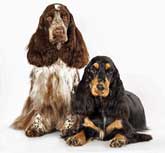 Learn How To Groom Your Cocker Spaniel
Learn How To Groom Your Cocker SpanielGrooming Your Cocker Spaniel regularly will help you spot signs of ill health before they become a more serious problem.
Keep your dog healthy by nipping potential problems in the bud!
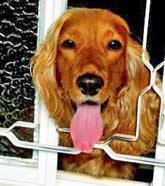 Puppy Eating Poop?
Puppy Eating Poop?Although you might think your puppy eating his poop is a disgusting habit, it's relatively common in the doggie world.
Follow this link if you'd like to learn why dogs eat poop and what you can do to help them break the habit.
 Cocker Rage Syndrome Is Very Rare
Cocker Rage Syndrome Is Very RareCocker Spaniel Rage Syndrome. Sounds scary, huh?
Don't worry; this condition is much rarer than people think. It's definitely recommended reading though!
 Cocker Spaniel Health
Cocker Spaniel HealthLearn how to keep your dog healthy and understand which dog diseases and illnesses your pet may have to deal with during his lifetime - forewarned is forearmed!
Keep your Cocker Spaniel healthy!
Please Note: As caring owners, our dog's health is important and is high on our agenda. It's essential that when we believe our pet is unwell, we don't try to diagnose the symptoms ourselves.
Yes, we need to be aware of dog health concerns, illnesses and symptoms and their remedies, but we must always consult a qualified veterinarian if we're worried about our pet's health.
Photo Credits for Cocker Spaniel Health Issues:
1. J T Poling at
Flickr.com - https://www.flickr.com/photos/92755733@N00/430533569
2. Wikipedia - https://commons.wikimedia.org/wiki/File:HookeFlea01.jpg
3. Julesinky2 at
Flickr.com
4. Andrea Izzotti at https://stock.adobe.com/fr/images/puppy-dog-english-cocker-spaniel/58893854
5. Sydney at https://stock.adobe.com/fr/images/portrait-of-a-puppy-cocker-spaniel-on-a-green-backgroundX54975737

